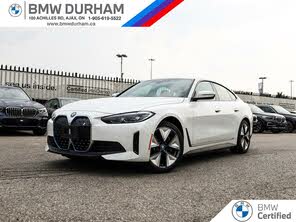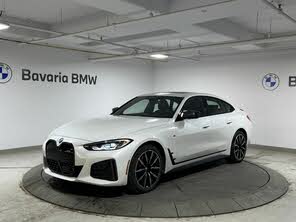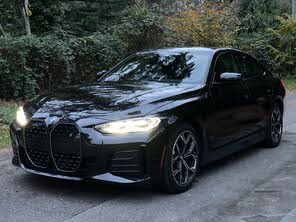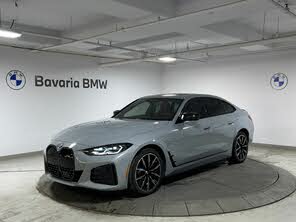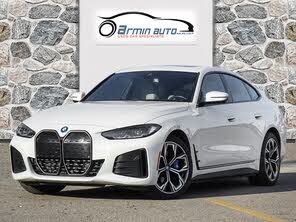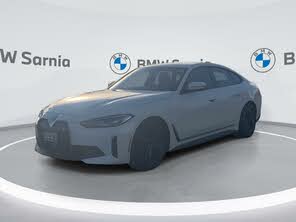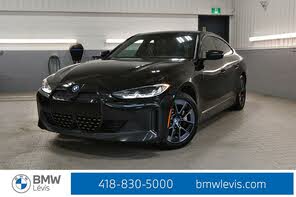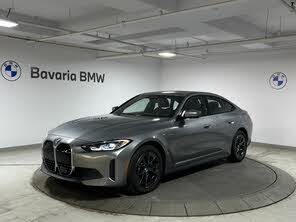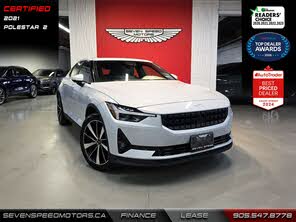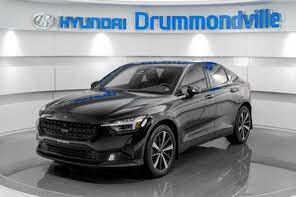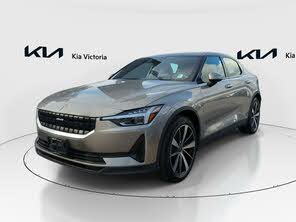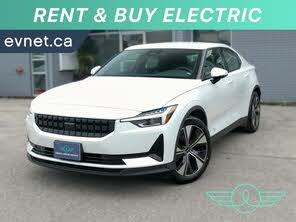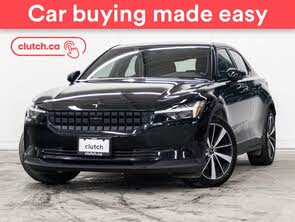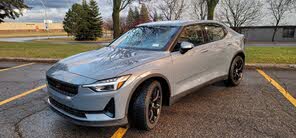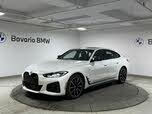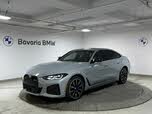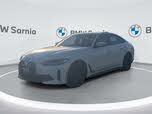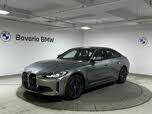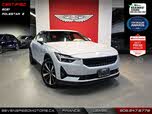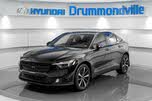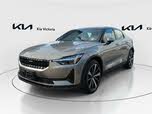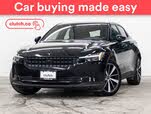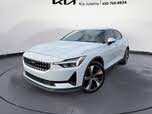BMW i4 vs Polestar 2
Overview | |
Years produced2020-Present | Years produced2022-Present |
MSRP$49,900 | MSRP$55,400 |
Average price | Average price$61,557 |
Listings19 | Listings151 |
Ratings & Reviews | |
User Reviews | User Reviews |
Expert reviews6.8 out of 10 | Expert reviews7.3 out of 10 |
Pros
| |
Reviews SummaryPolestar is one of the newest brands in the automotive firmament, but it still has a connection to an established automaker. The Polestar name originally belonged to an independent motorsports and tuning company focused on modifying Volvos. It was eventually acquired by the Swedish automaker, and for a short time became its performance sub-brand, similar to Mercedes-AMG or BMW M. Volvo then decided to reassign the Polestar name to a new brand focused on electric vehicles. Launched for the 2021 model year, the Polestar 2 was the new brand’s first volume model, following the limited-edition Polestar 1 plug-in hybrid. Polestar has other EVs planned, but for now the 2 remains its sole offering. The 2024 Polestar 2 gets some notable upgrades, including a range boost, revised styling, and some powertrain changes. All of that helps keep the 2 fresh in the face of competition like the Tesla Model 3 and Hyundai Ioniq 6. Polestar keeps its lineup simple. In Canada, buyers can choose between Long Range Single Motor and Long Range Dual Motor configurations, the latter available with a Performance Pack. We sampled the single-motor Polestar 2 for this review. | |
Reviews SummaryAfter entering the modern electric car era with the radical i3 hatchback, BMW is dialing things back a bit. The 2022 BMW i4 isn’t as radical as the i3, but it may also appeal to a wider audience. Instead of a dedicated platform, the i4 uses the same body shell as the gasoline BMW 4 Series Gran Coupe, which in turn is a four-door version of the BMW 4 Series coupe and convertible. The result is an electric vehicle with dimensions fairly close to the BMW 3 Series, the Bavarian automaker’s signature product. By offering an electric alternative, BMW is showing that it’s serious about electric vheicles (EVs). The i4’s closest rivals are the Tesla Model 3 and Polestar 2, as both are electric four-doors from premium brands. Most of BMW’s traditional rivals, such as Audi and Mercedes-Benz, are focusing on electric crossover SUVs and more expensive sedans for now. The Porsche Taycan is positioned above the i4 in price and performance aspirations. As with other BMW models, the i4 launches in multiple configurations based on its drivetrain rather than conventional trim levels. The single-motor rear-wheel drive (RWD) BMW i4 eDrive40 is the base model, and the one we test drove for this review. Buyers looking for more power can upgrade to the dual-motor all-wheel drive (AWD) i4 M50, which is featured in our video review, above. | |
No video found | |
Popular Features & Specs | |
Engine299 hp Electric | Engine335 hp Electric |
Drive TrainRWD | Drive TrainRWD |
Seating Capacity5 | Seating Capacity5 |
EV Battery Capacity82 kWh | EV Battery Capacity81.1 kWh |
MPG City124 | MPG City109 |
MPG Highway106 | MPG Highway108 |
Battery Charge Time (240V)8 hours | Battery Charge Time (240V)10 hours |
Engine | |
Engine Name299 hp Electric | Engine Name335 hp Electric |
Battery Charge Time (240V)8 hours | Battery Charge Time (240V)10 hours |
DrivetrainRWD | DrivetrainRWD |
Fuel Economy | |
EV Battery Capacity82 kWh | EV Battery Capacity81.1 kWh |
MPG City124 | MPG City109 |
MPG Highway106 | MPG Highway108 |
Interior | |
Seating Capacity5 | Seating Capacity5 |
Key Features | |
Navigation SystemStandard | Navigation SystemStandard |
Sunroof/Moonroof | Sunroof/MoonroofStandard |
Safety | |
Front Crash Overall5 | Front Crash Overall |
Side Crash Overall5 | Side Crash Overall |
Dimensions & Capacity | |
Cargo Space14.3 cu ft | Cargo Space16.6 cu ft |
Curb Weight4396 lbs | Curb Weight4665 lbs |
Height58.2 in | Height57.0 in |
Length181.3 in | Length188.5 in |
Width78.1 in | Width81.6 in |
Wheelbase107.7 in | Wheelbase112.4 in |
Maximum Payload925 lbs | Maximum Payload933 lbs |
Number of doors4 | Number of doors4 |
Maximum Towing Capacity2000 lbs | Maximum Towing Capacity |
Overview | ||
Years produced | 2020-Present | 2022-Present |
MSRP | $49,900 | $55,400 |
Average price | $61,557 | |
Listings | ||
Ratings & Reviews | ||
User reviews | ||
Expert reviews | 6.8 out of 10Read full review | 7.3 out of 10Read full review |
Pros & cons | Pros
| |
Summary | Polestar is one of the newest brands in the automotive firmament, but it still has a connection to an established automaker. The Polestar name originally belonged to an independent motorsports and tuning company focused on modifying Volvos. It was eventually acquired by the Swedish automaker, and for a short time became its performance sub-brand, similar to Mercedes-AMG or BMW M. Volvo then decided to reassign the Polestar name to a new brand focused on electric vehicles. Launched for the 2021 model year, the Polestar 2 was the new brand’s first volume model, following the limited-edition Polestar 1 plug-in hybrid. Polestar has other EVs planned, but for now the 2 remains its sole offering. The 2024 Polestar 2 gets some notable upgrades, including a range boost, revised styling, and some powertrain changes. All of that helps keep the 2 fresh in the face of competition like the Tesla Model 3 and Hyundai Ioniq 6. Polestar keeps its lineup simple. In Canada, buyers can choose between Long Range Single Motor and Long Range Dual Motor configurations, the latter available with a Performance Pack. We sampled the single-motor Polestar 2 for this review. | After entering the modern electric car era with the radical i3 hatchback, BMW is dialing things back a bit. The 2022 BMW i4 isn’t as radical as the i3, but it may also appeal to a wider audience. Instead of a dedicated platform, the i4 uses the same body shell as the gasoline BMW 4 Series Gran Coupe, which in turn is a four-door version of the BMW 4 Series coupe and convertible. The result is an electric vehicle with dimensions fairly close to the BMW 3 Series, the Bavarian automaker’s signature product. By offering an electric alternative, BMW is showing that it’s serious about electric vheicles (EVs). The i4’s closest rivals are the Tesla Model 3 and Polestar 2, as both are electric four-doors from premium brands. Most of BMW’s traditional rivals, such as Audi and Mercedes-Benz, are focusing on electric crossover SUVs and more expensive sedans for now. The Porsche Taycan is positioned above the i4 in price and performance aspirations. As with other BMW models, the i4 launches in multiple configurations based on its drivetrain rather than conventional trim levels. The single-motor rear-wheel drive (RWD) BMW i4 eDrive40 is the base model, and the one we test drove for this review. Buyers looking for more power can upgrade to the dual-motor all-wheel drive (AWD) i4 M50, which is featured in our video review, above. |
Video | No video found | |
Popular Features & Specs | ||
Engine | 299 hp Electric | 335 hp Electric |
Drive Train | RWD | RWD |
Seating Capacity | 5 | 5 |
EV Battery Capacity | 82 kWh | 81.1 kWh |
MPG City | 124 | 109 |
MPG Highway | 106 | 108 |
Battery Charge Time (240V) | 8 hours | 10 hours |
Engine | ||
Engine Name | 299 hp Electric | 335 hp Electric |
Battery Charge Time (240V) | 8 hours | 10 hours |
Drivetrain | RWD | RWD |
Fuel Economy | ||
EV Battery Capacity | 82 kWh | 81.1 kWh |
MPG City | 124 | 109 |
MPG Highway | 106 | 108 |
Interior | ||
Seating Capacity | 5 | 5 |
Key Features | ||
Navigation System | Standard | Standard |
Sunroof/Moonroof | Standard | |
Safety | ||
Front Crash Overall | 5 | |
Side Crash Overall | 5 | |
Dimensions & Capacity | ||
Cargo Space | 14.3 cu ft | 16.6 cu ft |
Curb Weight | 4396 lbs | 4665 lbs |
Height | 58.2 in | 57.0 in |
Length | 181.3 in | 188.5 in |
Width | 78.1 in | 81.6 in |
Wheelbase | 107.7 in | 112.4 in |
Maximum Payload | 925 lbs | 933 lbs |
Number of doors | 4 | 4 |
Maximum Towing Capacity | 2000 lbs | |

By: CarGurus + AI
At CarGurus, our team of experienced automotive writers remain at the heart of our content operation, conducting hands-on car tests and writing insightful guides that are backed by years of industry experience. To complement this, we are harnessing AI to make our content offering more diverse and more helpful to shoppers than ever. To achieve this, our AI systems are based exclusively on CarGurus content, ratings and data, so that what we produce is both unique to CarGurus, and uniquely helpful to car shoppers.



